The 10 Most Affecting Wes Anderson Moments
http://www.noisetosignal.org/film/2007/11/the-10-most-affecting-wes-anderson-moments.php
With the release of The Darjeeling Limited there came, predictably, a whole slew of reviews. And on the whole they, just as predictably, missed the point.
Not so much the point of the film itself, but the point of Wes Anderson as a film maker working today. The reviews seem to want to discuss all of his films at once, and make grand dismissive statements about his wooden characterizations, his complete lack of emotion, and the impossibility of a member of the audience relating to his characters.
In response I issue this...a list of what I feel are ten thoroughly affecting moments in his films. Anderson might not handle emotion the way Hollywood typically handles emotion (read: cliche), but his films have provided his audience with some of the most sincerely (and strangely) moving moments to come out of anywhere in years.
Oh, and before anyone asks...no. I did not forget about Bottle Rocket.
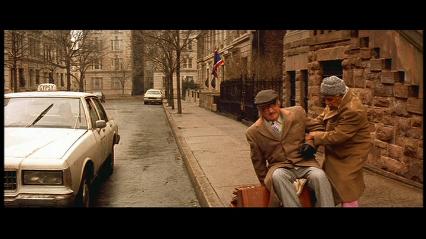 Royal Tenenbaum's plan to keep Henry Sherman from marrying his wife
comes apart about midway through the film when Henry does some
fact-checking, and determines that cheeseburgers and Tic-Tacs are not
effective treatments for stomach cancer.
Royal Tenenbaum's plan to keep Henry Sherman from marrying his wife
comes apart about midway through the film when Henry does some
fact-checking, and determines that cheeseburgers and Tic-Tacs are not
effective treatments for stomach cancer.
What follows is Royal's departure from the Tenenbaum home, and the only character not to desert him is his loyal-to-the-death manservant Pagoda...who chooses instead to stab him with a Swiss army knife.
Why, exactly, is this moving? Because of something a lot of people might not catch the first time through: despite the fact that Pagoda knifes him, he refuses to let Royal fall. He supports him under the arm and prevents him from tumbling backward; Pagoda is loyal even in rebellion. He lifts Royal to his feet, helps him into a cab, and even tends to the stab-wound in the very next scene.
As evidenced by the opening sequence, Pagoda has been a fixture of the Tenenbaum household since the children were...well, children, and it's easy to deduce that what he is doing here is exercising the oddly touching Tenenbaum esthetic: it's fair game to knife each other, but don't ever let a family member fall.
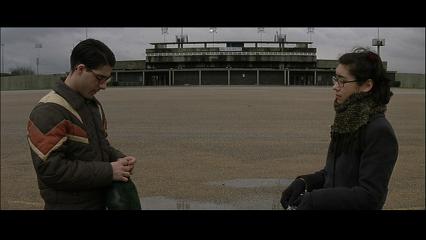 One of Max Fischer's crimes against himself--perhaps his cardinal
offense--is his habit of fixing his gaze on objects beyond his reach,
and missing out on everything that's been there all along, just waiting
for him to come around.
One of Max Fischer's crimes against himself--perhaps his cardinal
offense--is his habit of fixing his gaze on objects beyond his reach,
and missing out on everything that's been there all along, just waiting
for him to come around.
He seems to come to this realization himself toward the end of Rushmore, when classmate Margaret Yang finds him flying a kite. Margaret forces him to face the fact that his actions have emotional consequences as well. "You're a real jerk to me," she says. "You know that?" And we know that her words have taken root, because he apologizes. Overall, one can say many things about Max Fischer's questionable sincerity, but it's clear that he never apologizes until he feels truly remorseful.
He is sorry, because by this point in the film it's clear his pursuit of Miss Cross has come to nothing...and a young woman who's given him sympathy and support has been passively hurt by his complete inattention.
There's more than a little caution--however unintentional--present in the little story she tells him as well: her science fair project was a lie. She faked the results. Max understands the gravity of what she has said here, and it stings. In fact, it's why, immediately afterward, he decides to atone for his own falsified data by introducing Mr. Blume to his father...the barber.
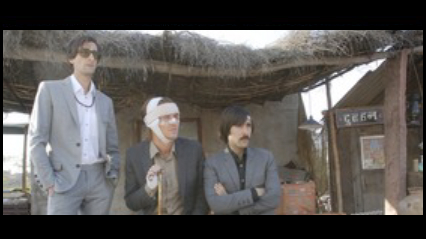 One very interesting thing about The Darjeeling Limited is
that its two most affecting scenes are wrapped around each other (or,
rather, this one is sandwiched between two halves of the other), so that
all of the real emotion comes in one continuous hit. Typically
Anderson spreads it thin, leaving lines and gestures stranded in places
sometimes very far removed from the previous or next display of emotion.
One very interesting thing about The Darjeeling Limited is
that its two most affecting scenes are wrapped around each other (or,
rather, this one is sandwiched between two halves of the other), so that
all of the real emotion comes in one continuous hit. Typically
Anderson spreads it thin, leaving lines and gestures stranded in places
sometimes very far removed from the previous or next display of emotion.
But that's not to say he does it any less adequately in Darjeeling. In fact, this particular scene, in which the three Whitman brothers attempt to drive their father's car to his funeral, is among Anderson's finest achievements, hands down. (In fact, I'd venture to say that it would work better as a short film than Hotel Chevalier.)
The entire scene is a display of thoroughly misplaced attention, as it's more important to the Whitmans to drive to their father's funeral in a symbolic vehicle than it is for them to be there in person, and they end up, it's suggested, missing the event entirely for all their fussing. It's symptomatic of the problems they must have faced as a family all along: it's not that they can't work together, it's that when they do work together, they're pulling in the wrong direction.
But it is still touching, and more than a little painful, when they try their best to do what they feel must be done, and this manic several minutes is highlighted by the most impressive display of brotherhood we ever see the Whitmans engage in when they threaten and stare down a tow-truck driver. Was the tow-truck driver in the wrong? Of course he wasn't. But whenever the Whitmans pull together, they're pulling in the wrong direction.
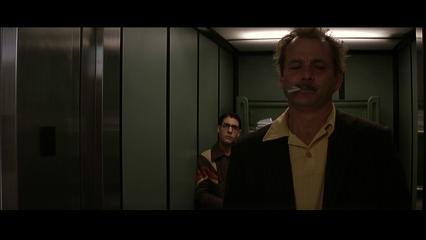 Dr. Guggenheim's stroke brings Max Fischer and Herman Blume together
again for a brief ride in an elevator that somehow, without really
saying anything, says absolutely everything anyone needs to know about
these characters.
Dr. Guggenheim's stroke brings Max Fischer and Herman Blume together
again for a brief ride in an elevator that somehow, without really
saying anything, says absolutely everything anyone needs to know about
these characters.
There's not so much an obvious awkwardness between them as there is an unspoken yearning to reconnect. They miss each other. Serious topics are touched upon (Blume's divorce, Miss Cross' whereabouts) but neither of them is able to offer up anything of substance. They bat a few banalities back and forth and refuse eye contact.
But there is a love there...that love that comes along with mutual respect and can never quite be killed. Blume's initial "Hey, amigo" is a clear linguistic nod to the fact that he would love to still consider Max a friend, but cannot actually use the word. And Max's final line upon Blume's departure ("Hey, is everything okay?") is helplessly genuine. Blume's confession of loneliness is made all the more painful by the logistical fact that, as he says it, he only allows Max a few of the back of his head.
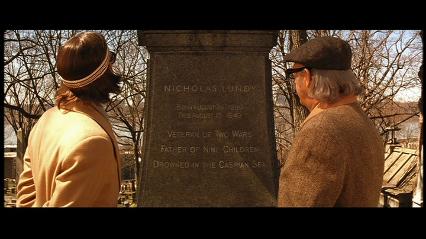 The Royal Tenenbaums is segmented into chapters, like a novel,
or possibly a biography. But one scene stands outside of the film's
literary organization: between Chapter Three and Chapter Four, we have a
length installment titled Maddox Hill Cemetary. It's here that the
various characters from the film pair off--and reorganize those
pairs--for the sake, yes, of plot development, but also for some truly
painful Tenenbaum interaction.
The Royal Tenenbaums is segmented into chapters, like a novel,
or possibly a biography. But one scene stands outside of the film's
literary organization: between Chapter Three and Chapter Four, we have a
length installment titled Maddox Hill Cemetary. It's here that the
various characters from the film pair off--and reorganize those
pairs--for the sake, yes, of plot development, but also for some truly
painful Tenenbaum interaction.
From Royal shaking a few flowers free of his own bouquet for the grave of Chas' wife to Richie giving his signature silent greeting to a passerby who recognizes him from his glory days, Neither Anderson nor his actors, nor his original score composer, stumble at all. Everything is here, either spoken or unspoken. We see exactly why the Tenenbaums would, on some level, like to operate again as a family, and also--more apparently--why they never can.
It's appropriate that this scene is without a chapter number...it exists, more than any other scene in the film, during several time periods. Each of the Tenenbaum children has a flashback that explains at least partly what happened to them between their glorious childhood and their tormented adult lives.
Mothersbaugh understands this scene on some level beyond the logical and even the emotional. He understands what fuels the world in which The Royal Tenenbaums exists, and his score for this scene ranks high among his best work. It's beautiful, it's bashful, it's aware of its own limitations. This is the music one would hear if you dropped a phonograph needle onto Richie Tenenbaum's heart, and it stirs one of those rare, perfect emotions that can only be triggered by a brilliant director and a brilliant composer working off of each other in total harmony.
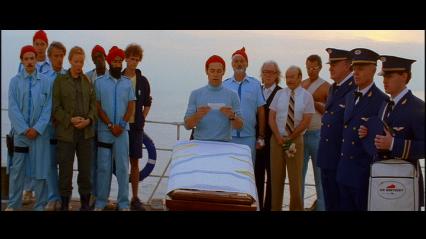 We know very little of Ned's life before he joined up with Team
Zissou, and, as far as the interests of the film are concerned, that's a
good thing. It makes his last moments on board the Belafonte that much
more significant.
We know very little of Ned's life before he joined up with Team
Zissou, and, as far as the interests of the film are concerned, that's a
good thing. It makes his last moments on board the Belafonte that much
more significant.
Had we been granted a view of a greater portion of his life, the rest of the Zissou crew would represent only a small portion of all those he came to know. Since we are given only a much narrower narrative perspective, the crew represents everybody we've seen him associate with, and their turnout to wave farewell before his fatal helicopter ride is overpowering in its significance. Nobody suspects that they will never see him alive again, yet they're all there...waving at his departure. It's just one of those morbid coincidences, I guess, that none of the characters would really understand.
Most touching of all is Klaus' farewell, which includes, importantly, an olive-branch by way of salute. He wants Ned to know how much it means to him that Ned worked a K for Klaus onto redesigned Zissou insignia, but, more importantly, he wants him to know that he's come to accept him as a fellow crew member. (And, in terms of the de-facto Zissou "family," a brother.)
Steve is the only one who does not get the chance to say goodbye to Ned, though he is present for his final moments, and it is he who pulls his body to shore. It's more than a little telling, as well, that the sharp cuts in Steve's "death vision" sequence are so similar in style to Richie Tenenbaum's. The difference, of course, is that Richie lived a full emotional life...and Steve's visions are nothing more than flat colors, bubbles rushing to the surface, and one fleeting, final glimpse of Ned, who financed the voyage financially, and then, with more than a little symbolism, paid for it with his life.
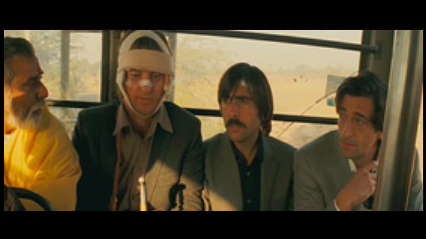 The turning-point for one of the main characters (and possibly for
the film itself) comes when the three Whitman brothers see three young
Indian boys fall into a dangerous river. That's one boy for each
brother, right? And because they're affluent Americans they ought to be
automatically heroes. There's really nothing at stake when the
Whitmans dive in after the boys. Mathematically, everything is going to
be just fine.
The turning-point for one of the main characters (and possibly for
the film itself) comes when the three Whitman brothers see three young
Indian boys fall into a dangerous river. That's one boy for each
brother, right? And because they're affluent Americans they ought to be
automatically heroes. There's really nothing at stake when the
Whitmans dive in after the boys. Mathematically, everything is going to
be just fine.
Imagine, then, the shock to Peter Whitman when he fails to save one of the boys. He emerges from the river bloodied and bruised and carrying a lifeless body, and he's so far beyond emotion that he can't do anything but mutter fast facts. "I didn't save mine." "He's dead." "The rocks killed him." The audience might believe, initially, that Peter's blow to the head left him stammering, but it's clear before long that the real damage was wrought more deeply. His entire sense of life and possibility has been thrown for a loop--he was not the automatic hero he expected himself to be. In fact, he was a failure. He ends up having to deliver a dead child to a grieving father, and though Peter does not cry, it's not because he feels no sorrow; it's because he feels a sorrow too large to convey.
The brothers spend a good deal of time in this particular village, and Peter may never get the chance to atone for what's happened, but he does come out the other side of it with a much more mature view of his own impending fatherhood. Something that he was treating as a sort of flippant obstacle has actually come to have meaning for him, and he may not be a completely changed man but, after this incident, I'm sure he'd wince at having to hear the things he'd said just a few days before about leaving his wife before the child was born.
Adrien Brody, as of this film, is a newcomer to Anderson's menagerie of actors, and as of this precise moment, when he emerges from the river speaking crisply and levelly about the child whose life he could not save, he establishes himself as a perfect fit. (Also, for the record, Brody wins the Saddest Eyes award, which is always a serious achievement in a Wes Anderson film.)
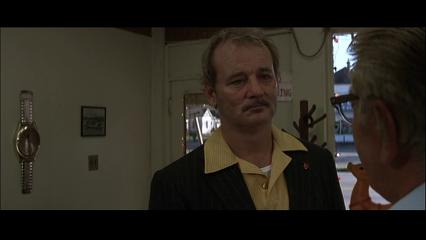 There's no greater change wrought in Max during the course of Rushmore
than the one so clearly on display when he humbly introduces Mr. Blume
to his father. He is letting Blume see a side of him that, clearly,
very few people have been allowed to see, but also he is showing it to
himself, letting himself, for once, be reflected in his own eyes.
There's no greater change wrought in Max during the course of Rushmore
than the one so clearly on display when he humbly introduces Mr. Blume
to his father. He is letting Blume see a side of him that, clearly,
very few people have been allowed to see, but also he is showing it to
himself, letting himself, for once, be reflected in his own eyes.
A great thing about this scene that can easily go unnoticed is that the two adults are each aware of more than they're actually saying. Mr. Blume had earlier been led to believe that Max's father was a neurosurgeon, and it's safe to assume that Mr. Fischer is aware that his meager occupation has probably been kept a careful secret by his high-reaching son...and yet neither of them call him on it. Blume's heart breaks, and you can see it in Bill Murray's surprisingly expressive eyes, not just because he's been allowed a glimpse of Max's secret, but because he pities the situation between father and son that is preventing them from really connecting the way they should.
"I don't know, Burt," says Blume, apropos of nothing, and it's one of the most honest lines in the film. Something real is being unveiled to him here, and he's incapable of analyzing it. Some silent lesson is being preached, and he's woefully aware that its moral will be lost to him. He envies the simplicity of the barber's life, and at the same time understands precisely, guiltily, why Max aches to rise above it.
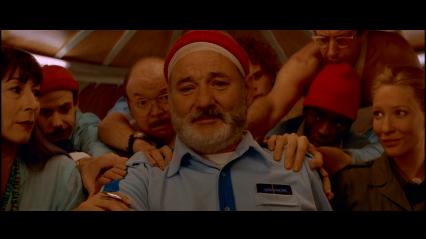 When Steve finally comes face to face with the Jaguar Shark again,
there's very little he can do but ponder the wisdom of his journey, and
reflect--wordlessly--upon everything his crew has had to endure in quest
of his purely selfish revenge.
When Steve finally comes face to face with the Jaguar Shark again,
there's very little he can do but ponder the wisdom of his journey, and
reflect--wordlessly--upon everything his crew has had to endure in quest
of his purely selfish revenge.
The submarine (aptly named Deep Search) is filled with what remains of his crew and his family, along with a business partner, a reporter, an intern, and a representative of his bond company, all of whom have suffered in some tangible way for the advancement of Steve's goal. And yet, when he finally reaches that goal, he cries openly, for the first and only time in the film. He gains--a long, long way into his life and career--some understanding of the greater shape of the world around him, and he sees how little right he had to behave so carelessly with other people's lives.
The real weight in the scene is the non-presence of Ned, who died in pursuit of the beast, and we suspect that the death of his previous partner Esteban sits heavy on Steve's conscience as well, but his emotion is coming from the fact that it took him too long to realize the price of his revenge, and that there's no way to turn back and undo everything he's lost on the way.
He is forgiven, however, by those along for the ride on Deep Search, as, one by one, his remaining companions lay a comforting hand on him. There are no accusations, there is no disappointment. They find themselves in a submarine with a captain who has suddenly become fragile and human, and one hand at a time, they do their best to hold him together.
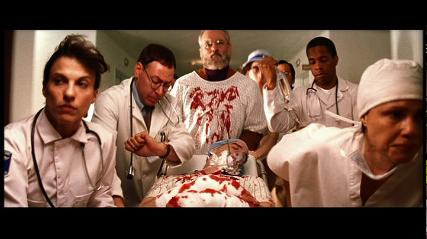 There's very little that can be said of a scene that says everything
itself so perfectly. Relied upon (and used) by the other characters as
the most level-headed and caring of the Tenenbaum family, the viewer is
more aware than any of the characters how much suffering he
internalizes. And so, when at last he learns more about his sister than
he was ever prepared to know, and he walks slowly and quietly out the
door, we know that something is about to happen, and it's not going to
be anything good.
There's very little that can be said of a scene that says everything
itself so perfectly. Relied upon (and used) by the other characters as
the most level-headed and caring of the Tenenbaum family, the viewer is
more aware than any of the characters how much suffering he
internalizes. And so, when at last he learns more about his sister than
he was ever prepared to know, and he walks slowly and quietly out the
door, we know that something is about to happen, and it's not going to
be anything good.
Elliott Smith's terrifying Needle in the Hay starts up, and Anderson does something very clever by allowing it to begin over an unrelated scene between Royal and one of the hotel managers--a first-time viewer would never catch it, but every subsequent time those dark chords of Smith's bring some very vivid images to mind and throughout a comic scene we are already aware of a forthcoming parallel tragedy.
The entire scene with Richie in the bathroom is cut brutally, hastily...it doesn't flow; it's been hacked to pieces. This serves to echo not only the immediate content of the scene (Richie's self-administered haircut) but also the end to which it builds: his wrist-slashing attempt at suicide.
It's Anderson at his most fearless; he's triggering emotions, but not allowing anyone to get caught up in them. There is no moment during which any characters take pause to weep. The score is not touching--it's tough and tightly-squared. It's played blue and emotionless, which is, of course, why it works so well. We are not being asked to align ourselves with anybody else's emotions...we are supposed to view what is happening from the perspective of an outsider. We are supposed to feel growing concern as Richie removes his headband, his hair, his beard, his glasses...he is exposing himself. Layer by layer he is making himself more vulnerable. And when he sees what's beneath--that young man who could have had anything--he lashes out to destroy it.
We are allowed brief dips into his thought process by means of abrupt, almost subliminal flashes of film we've already seen, and it's not so much meant to represent a dying man's last glance backward as it is to represent the agony of a man who can no longer stand to be alive.
Richie Tenenbaum still stands as Anderson's most tragic character, and certainly the least deserving of his own pain. But that's precisely what makes him so real.
*For me, although I haven't necessarily been able to put it into words, this is the real passion I have for Wes Anderson films- and what made me love them in the first place. The fact that his films are so perfectly heart felt and poignant, in a truthful, philosophical and honest way- that's what, amongst all the wonderful features, really seals the deal for me. This publication, found online, is a great summary of the poignant film plotlines. Brilliant stuff.
Not so much the point of the film itself, but the point of Wes Anderson as a film maker working today. The reviews seem to want to discuss all of his films at once, and make grand dismissive statements about his wooden characterizations, his complete lack of emotion, and the impossibility of a member of the audience relating to his characters.
In response I issue this...a list of what I feel are ten thoroughly affecting moments in his films. Anderson might not handle emotion the way Hollywood typically handles emotion (read: cliche), but his films have provided his audience with some of the most sincerely (and strangely) moving moments to come out of anywhere in years.
Oh, and before anyone asks...no. I did not forget about Bottle Rocket.
10) "That's the last time you put a knife in me. You hear me?" - The Royal Tenenbaums

What follows is Royal's departure from the Tenenbaum home, and the only character not to desert him is his loyal-to-the-death manservant Pagoda...who chooses instead to stab him with a Swiss army knife.
Why, exactly, is this moving? Because of something a lot of people might not catch the first time through: despite the fact that Pagoda knifes him, he refuses to let Royal fall. He supports him under the arm and prevents him from tumbling backward; Pagoda is loyal even in rebellion. He lifts Royal to his feet, helps him into a cab, and even tends to the stab-wound in the very next scene.
As evidenced by the opening sequence, Pagoda has been a fixture of the Tenenbaum household since the children were...well, children, and it's easy to deduce that what he is doing here is exercising the oddly touching Tenenbaum esthetic: it's fair game to knife each other, but don't ever let a family member fall.
9) You're a real jerk to me, you know that?" - Rushmore

He seems to come to this realization himself toward the end of Rushmore, when classmate Margaret Yang finds him flying a kite. Margaret forces him to face the fact that his actions have emotional consequences as well. "You're a real jerk to me," she says. "You know that?" And we know that her words have taken root, because he apologizes. Overall, one can say many things about Max Fischer's questionable sincerity, but it's clear that he never apologizes until he feels truly remorseful.
He is sorry, because by this point in the film it's clear his pursuit of Miss Cross has come to nothing...and a young woman who's given him sympathy and support has been passively hurt by his complete inattention.
There's more than a little caution--however unintentional--present in the little story she tells him as well: her science fair project was a lie. She faked the results. Max understands the gravity of what she has said here, and it stings. In fact, it's why, immediately afterward, he decides to atone for his own falsified data by introducing Mr. Blume to his father...the barber.
8) "Tell them we'll be there in five minutes." - The Darjeeling Limited

But that's not to say he does it any less adequately in Darjeeling. In fact, this particular scene, in which the three Whitman brothers attempt to drive their father's car to his funeral, is among Anderson's finest achievements, hands down. (In fact, I'd venture to say that it would work better as a short film than Hotel Chevalier.)
The entire scene is a display of thoroughly misplaced attention, as it's more important to the Whitmans to drive to their father's funeral in a symbolic vehicle than it is for them to be there in person, and they end up, it's suggested, missing the event entirely for all their fussing. It's symptomatic of the problems they must have faced as a family all along: it's not that they can't work together, it's that when they do work together, they're pulling in the wrong direction.
But it is still touching, and more than a little painful, when they try their best to do what they feel must be done, and this manic several minutes is highlighted by the most impressive display of brotherhood we ever see the Whitmans engage in when they threaten and stare down a tow-truck driver. Was the tow-truck driver in the wrong? Of course he wasn't. But whenever the Whitmans pull together, they're pulling in the wrong direction.
7) "I'm a little bit lonely these days." - Rushmore

There's not so much an obvious awkwardness between them as there is an unspoken yearning to reconnect. They miss each other. Serious topics are touched upon (Blume's divorce, Miss Cross' whereabouts) but neither of them is able to offer up anything of substance. They bat a few banalities back and forth and refuse eye contact.
But there is a love there...that love that comes along with mutual respect and can never quite be killed. Blume's initial "Hey, amigo" is a clear linguistic nod to the fact that he would love to still consider Max a friend, but cannot actually use the word. And Max's final line upon Blume's departure ("Hey, is everything okay?") is helplessly genuine. Blume's confession of loneliness is made all the more painful by the logistical fact that, as he says it, he only allows Max a few of the back of his head.
6) "That's a hell of a damn grave. I wish it were mine." - The Royal Tenenbaums

From Royal shaking a few flowers free of his own bouquet for the grave of Chas' wife to Richie giving his signature silent greeting to a passerby who recognizes him from his glory days, Neither Anderson nor his actors, nor his original score composer, stumble at all. Everything is here, either spoken or unspoken. We see exactly why the Tenenbaums would, on some level, like to operate again as a family, and also--more apparently--why they never can.
It's appropriate that this scene is without a chapter number...it exists, more than any other scene in the film, during several time periods. Each of the Tenenbaum children has a flashback that explains at least partly what happened to them between their glorious childhood and their tormented adult lives.
Mothersbaugh understands this scene on some level beyond the logical and even the emotional. He understands what fuels the world in which The Royal Tenenbaums exists, and his score for this scene ranks high among his best work. It's beautiful, it's bashful, it's aware of its own limitations. This is the music one would hear if you dropped a phonograph needle onto Richie Tenenbaum's heart, and it stirs one of those rare, perfect emotions that can only be triggered by a brilliant director and a brilliant composer working off of each other in total harmony.
5) "All hands bury the dead." - The Life Aquatic With Steve Zissou

Had we been granted a view of a greater portion of his life, the rest of the Zissou crew would represent only a small portion of all those he came to know. Since we are given only a much narrower narrative perspective, the crew represents everybody we've seen him associate with, and their turnout to wave farewell before his fatal helicopter ride is overpowering in its significance. Nobody suspects that they will never see him alive again, yet they're all there...waving at his departure. It's just one of those morbid coincidences, I guess, that none of the characters would really understand.
Most touching of all is Klaus' farewell, which includes, importantly, an olive-branch by way of salute. He wants Ned to know how much it means to him that Ned worked a K for Klaus onto redesigned Zissou insignia, but, more importantly, he wants him to know that he's come to accept him as a fellow crew member. (And, in terms of the de-facto Zissou "family," a brother.)
Steve is the only one who does not get the chance to say goodbye to Ned, though he is present for his final moments, and it is he who pulls his body to shore. It's more than a little telling, as well, that the sharp cuts in Steve's "death vision" sequence are so similar in style to Richie Tenenbaum's. The difference, of course, is that Richie lived a full emotional life...and Steve's visions are nothing more than flat colors, bubbles rushing to the surface, and one fleeting, final glimpse of Ned, who financed the voyage financially, and then, with more than a little symbolism, paid for it with his life.
4) "I didn't save mine." - The Darjeeling Limited

Imagine, then, the shock to Peter Whitman when he fails to save one of the boys. He emerges from the river bloodied and bruised and carrying a lifeless body, and he's so far beyond emotion that he can't do anything but mutter fast facts. "I didn't save mine." "He's dead." "The rocks killed him." The audience might believe, initially, that Peter's blow to the head left him stammering, but it's clear before long that the real damage was wrought more deeply. His entire sense of life and possibility has been thrown for a loop--he was not the automatic hero he expected himself to be. In fact, he was a failure. He ends up having to deliver a dead child to a grieving father, and though Peter does not cry, it's not because he feels no sorrow; it's because he feels a sorrow too large to convey.
The brothers spend a good deal of time in this particular village, and Peter may never get the chance to atone for what's happened, but he does come out the other side of it with a much more mature view of his own impending fatherhood. Something that he was treating as a sort of flippant obstacle has actually come to have meaning for him, and he may not be a completely changed man but, after this incident, I'm sure he'd wince at having to hear the things he'd said just a few days before about leaving his wife before the child was born.
Adrien Brody, as of this film, is a newcomer to Anderson's menagerie of actors, and as of this precise moment, when he emerges from the river speaking crisply and levelly about the child whose life he could not save, he establishes himself as a perfect fit. (Also, for the record, Brody wins the Saddest Eyes award, which is always a serious achievement in a Wes Anderson film.)
3) "Mr. Blume...this is my father, Burt Fischer." - Rushmore

A great thing about this scene that can easily go unnoticed is that the two adults are each aware of more than they're actually saying. Mr. Blume had earlier been led to believe that Max's father was a neurosurgeon, and it's safe to assume that Mr. Fischer is aware that his meager occupation has probably been kept a careful secret by his high-reaching son...and yet neither of them call him on it. Blume's heart breaks, and you can see it in Bill Murray's surprisingly expressive eyes, not just because he's been allowed a glimpse of Max's secret, but because he pities the situation between father and son that is preventing them from really connecting the way they should.
"I don't know, Burt," says Blume, apropos of nothing, and it's one of the most honest lines in the film. Something real is being unveiled to him here, and he's incapable of analyzing it. Some silent lesson is being preached, and he's woefully aware that its moral will be lost to him. He envies the simplicity of the barber's life, and at the same time understands precisely, guiltily, why Max aches to rise above it.
2) "I wonder if it remembers me." - The Life Aquatic With Steve Zissou

The submarine (aptly named Deep Search) is filled with what remains of his crew and his family, along with a business partner, a reporter, an intern, and a representative of his bond company, all of whom have suffered in some tangible way for the advancement of Steve's goal. And yet, when he finally reaches that goal, he cries openly, for the first and only time in the film. He gains--a long, long way into his life and career--some understanding of the greater shape of the world around him, and he sees how little right he had to behave so carelessly with other people's lives.
The real weight in the scene is the non-presence of Ned, who died in pursuit of the beast, and we suspect that the death of his previous partner Esteban sits heavy on Steve's conscience as well, but his emotion is coming from the fact that it took him too long to realize the price of his revenge, and that there's no way to turn back and undo everything he's lost on the way.
He is forgiven, however, by those along for the ride on Deep Search, as, one by one, his remaining companions lay a comforting hand on him. There are no accusations, there is no disappointment. They find themselves in a submarine with a captain who has suddenly become fragile and human, and one hand at a time, they do their best to hold him together.
1) "I'm going to kill myself tomorrow." - The Royal Tenenbaums

Elliott Smith's terrifying Needle in the Hay starts up, and Anderson does something very clever by allowing it to begin over an unrelated scene between Royal and one of the hotel managers--a first-time viewer would never catch it, but every subsequent time those dark chords of Smith's bring some very vivid images to mind and throughout a comic scene we are already aware of a forthcoming parallel tragedy.
The entire scene with Richie in the bathroom is cut brutally, hastily...it doesn't flow; it's been hacked to pieces. This serves to echo not only the immediate content of the scene (Richie's self-administered haircut) but also the end to which it builds: his wrist-slashing attempt at suicide.
It's Anderson at his most fearless; he's triggering emotions, but not allowing anyone to get caught up in them. There is no moment during which any characters take pause to weep. The score is not touching--it's tough and tightly-squared. It's played blue and emotionless, which is, of course, why it works so well. We are not being asked to align ourselves with anybody else's emotions...we are supposed to view what is happening from the perspective of an outsider. We are supposed to feel growing concern as Richie removes his headband, his hair, his beard, his glasses...he is exposing himself. Layer by layer he is making himself more vulnerable. And when he sees what's beneath--that young man who could have had anything--he lashes out to destroy it.
We are allowed brief dips into his thought process by means of abrupt, almost subliminal flashes of film we've already seen, and it's not so much meant to represent a dying man's last glance backward as it is to represent the agony of a man who can no longer stand to be alive.
Richie Tenenbaum still stands as Anderson's most tragic character, and certainly the least deserving of his own pain. But that's precisely what makes him so real.
*For me, although I haven't necessarily been able to put it into words, this is the real passion I have for Wes Anderson films- and what made me love them in the first place. The fact that his films are so perfectly heart felt and poignant, in a truthful, philosophical and honest way- that's what, amongst all the wonderful features, really seals the deal for me. This publication, found online, is a great summary of the poignant film plotlines. Brilliant stuff.

No comments:
Post a Comment